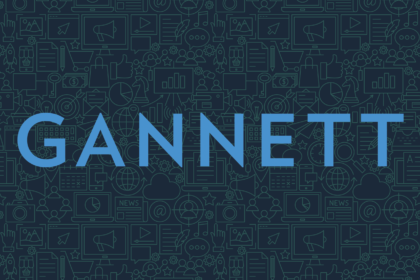
Gannett announced a strategic reorganization Wednesday, dialing back on top executive effort devoted to publishing while elevating its smaller but growing digital marketing services business to one of two operating units.
Maribel Perez Wadsworth, already in charge of USA Today and the regional USA Today network of 250 newspapers and sites, becomes president of Gannett Media, the publishing division.
As USA Today reported, two other publishing executives — Kevin Gentzel, the top advertising and revenue officer for the last seven years, and Bernie Szachara, who had been president of U.S. publishing operations — are leaving the company.
The move puts fresh focus on digital marketing, which currently generates only about a seventh of the total revenue of the company, but is growing and profitable, with further good prospects looking forward.
I spoke with Kris Barton, promoted in the new structure from chief product officer to president of the new unit. “It is smaller,” Barton said, ”but it already is a large business ($450 million-plus in annual revenue).”
“Also it fits with our ties to local communities by helping local businesses” with various digital marketing solutions. Those include lead generation, tech support and a flow of information on performance — and also placing advertising on Google and Facebook, a potent force now in local marketing.
The unit’s business model also fits Gannett’s current emphasis on digital subscriptions on the publishing side, he said, since customers pay for a package of services delivered monthly rather than buying them piecemeal.
Gannett bought a digital marketing business, ReachLocal, in 2016. Barton, whose previous experience included product work at Microsoft, came along with the deal. ReachLocal was based in the Los Angeles area, and Barton will continue to work primarily from there, even though the company’s headquarters is in Northern Virginia.
The reorganization, he said, will help “legitimize” the big role the unit plays at Gannett and streamline reporting relationships.
Digital marketing began popping up in the newspaper business a decade ago, typically as an offering to advertising clients, who lacked the resources to ramp up such programs on their own.
That’s still part of the customer base, Barton said, but only a part. The service is not confined to Gannett’s markets, he said. And it is being sold internationally, including Canada, Australia, New Zealand and the United Kingdom, where Gannett owns the large regional Newsquest group.
Barton said that he was proud that the digital marketing group has shown double-digit percentage revenue growth over the last year, “and our level of investment is high, growing the business at the expense of some profit.”
Gannett now describes itself (as in its most recent earnings report) as “a subscription-led and digitally-focused media and marketing solutions company that is committed to empowering communities to thrive.”
That and the reorganization do not mean that publishing is being pushed aside. One of the company’s biggest announced goals is to quickly build paid digital subscriptions to USA Today and its regional publications, with a target of growing from 1.75 million now to six million by 2025.
For print, the ambition is more modest — stabilizing the legacy business where subscription numbers and advertising revenues have been declining precipitously.
As I have noted before, Gannett — along with other newspaper and magazine groups — seems to really mean it now when CEO Mike Reed talks about digital transformation. That’s a juggling act of sorts, though, when print circulation and advertising revenues still loom large even as they contract.
Count this week’s reorganization as one more indicator that Gannett is betting on what’s growing and digital as opposed to what is simply big.
Twitter long resisted the idea of an edit button, but now appears to be giving in to the wishes of its users.
Fox News didn’t contend it had no legal obligation to be truthful, nor did a court uphold that.
As an incarcerated writer, I too often encounter publications demanding sensational content with shock value about events inside the prison walls.
Instead of the tedious undertaking of fact-checking every single false claim, proponents of prebunking advocate for mass inoculation.
This group of 31 leaders will convene at Poynter in St. Petersburg, Florida, the week of Sept. 18.
Get the Poynter newsletter that’s right for you.
Support responsible news and fact-based information today!




